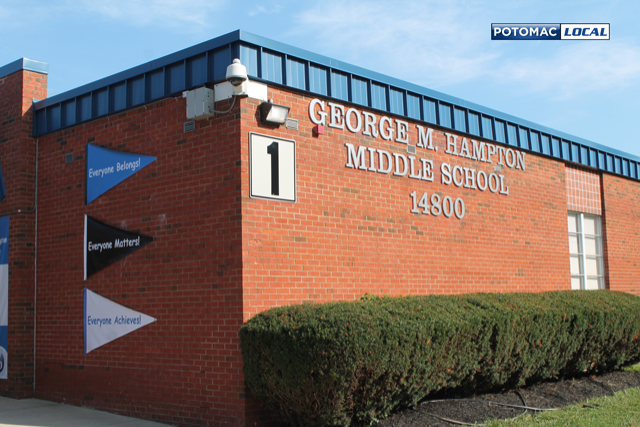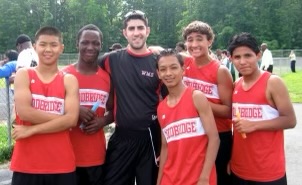Exclusive interview with Justin Wilk
The Potomac School District representative discusses accomplishments, proposed curriculum changes and lessons learned along the way
As he prepares for another run as Potomac District School Board Representative, Justin Wilk spoke with the PW Perspective about many accomplishments during his tenure. Among them was one that wasn’t planned but has had significant impact on the community.
“We had just been sworn in that December,” said Wilk. “For me, it blessed me to take on an incumbent in (former representative) Betty Covington, but I worked very hard in my district to meet with voters every day. However, I wanted to prove from the onset that we needed to right some wrongs. One example was the teacher extensions, and giving them a 1 to 2 percent pay raise. I just left the classroom myself after being a history teacher, and I felt it was an injustice.”
While the former teacher was working to help teachers obtain higher pay raises, it was the challenge of re-naming Godwin Middle School.
“I got on the board, and one thing you don’t even think about are the re-naming of buildings. I was immersed in the Kyle Wilson Elementary School naming, as well as the redrawing of the boundaries, which affected some schools in my district.”
Regarding the name change, “There are two extreme ideas of thought, especially when it was time to rename Godwin Middle School.”
He recalls the challenges that took place. “On the surface, the dynamics did not look promising. A large contingent of African Americans were coming out to support Dr. George Hampton, and it was a large white contingency for Kyle Wilson, who served our community well as a firefighter. I understood how Dr. Hampton had been up for consideration before I came on the board.”
Wilk spoke with Dr. Hampton. ” I didn’t know much about him, but I wanted to know who he was. We had a great conversation. I learned he was a former boxer and had a lot of energy. It reminded me of my grandmother. He was someone who contributed to the community, through his fraternity and philanthropy. He served our country when the military was segregated. Learning more about him through my colleague, Lillie Jessie, and getting great people like Joe and Andrea Fletcher helped me to understand why we needed to recognize the hard work that Dr. Hampton has done.”
Those conversations helped him to see a different view of the culture in comparison to his days in the Midwest.
“I grew up in Michigan and it was a different world moving here in 2007. What I love about Virginia is that while they legally segregated the state due to heavy resistance, the dynamics and melting pot aspect are amazing. My family and I live in a neighborhood where we are the minority, and that’s great. I went to high school in South Lyon, where it was a product of ‘white flight,’ and there was only one African-American student in the school. Looking on the outside, it has showed me just how far we have come to be more united.”
How did it start? “I used to coach track and football, so when we play against Godwin. They were named the Governors, so I thought, ‘Hmm, that’s different.’ I did a cursory overview of who he was, and I discovered that he had a checkered past when it came to segregation. I knew then that we had to do something.”
He received advice from Occoquan District Representative Lillie Jessie one how to proceed. “Lillie told me that there could be concerns about making this decision to rename the school after Dr. Hampton. She had grown up in the South and thought there could be some type of racial backlash by doing this.”

Looking back, he recalls how things could have been done differently? “Being there for seven years, I asked myself ‘Could it have been done differently?” Yes, not because of the name change, but I would have consulted with the community more prior to the name change.”
“Maybe it had to be done this way, because this opened the door for understanding why there had to be a change. It was important to have an African-American name replace the one of a segregationist.”
Recently, Governor Glenn Youngkin’s administration has pushed for changes to the history and social sciences curriculum, something Wilk challenges. “We don’t talk about Virginia history,” he said. “We may discuss the civil rights movement, but we don’t delve into Brown v. Board of Education, and its implications on the Black community as a whole.”
“As we dive into that, you can’t help but realize that Miles Godwin was an architect of massive resistance and segregation in our schools. Also, after he died, in his obituary, he never apologized. His actions to keep African American students outside of public schools for several years in Prince Edward County were atrocious. As a product of the Byrd machine, it benefitted many white students to receive vouchers for private schools.”
Have they improved? “Now we’re seeing African-American students walking in a school no longer named for a segregationist. However, that wasn’t the only problem at the school. Some conditions were dilapidated; and they had largely ignored it. If we’re talking about equity, then these buildings need attention. One of the things about the name change was not only the recognition of a more diverse community, but it brought a renewed energy. There were more contributions from Dr. Hampton, and his fraternity helped to spruce the building.”
Another topic is the issue of infrastructure to meet equitable needs in the district. “I think it’s a tough position, because the whole advocacy for Woodbridge in terms of renovation is challenging. Although there has been a lot of work done in schools such as Gar-Field High School, a lot of the infrastructure is limited in scope. For example, we had the land available to make the upgrades to Potomac Shores, but then you look at Graham Park Middle School, the changes have to be incremental. We are changing the front of the building, improving its HVAC systems, and the natural lighting. Those are positive steps we can take to improve the experience for students.”
Speaking of which, “Dumfries Elementary School was discussed as to having a complete renovation similar to Kilby Elementary School, but my predecessor didn’t want that to happen due to its historical significance. We have put a new LED sign in the front, and will continue to make improvements as they go along.”
“There has been progress on the eastern side of the county. We are seeing revitalization along the Route 1 and 234 areas, and it is something we will continue to work on in the future.”
History and social science curriculum proposals for the secondary schools are something he believes should be implemented. “My district has a large African-American contingency, and you cannot embellish the facts. History didn’t stop at the Civil War, and with the Freedman Bureau, it’s much more complicated than we are discussing. It’s vital for any constituency, but for someone who represents a minority-majority district, we need to have an African-American studies curriculum. I believe we’re moving towards that, and a concerted effort to focus on the cultural awareness. Potomac High School has two sections focused on that, and Forest Park has a student group concentrating on issues like this. We need to make sure the complete history is taught to the students, both good and bad.”
“While Mills Godwin was instrumental in the first state income tax and his work towards community colleges, he also held back Black students for several years from getting an equal education. We can teach both, and let students know the true aspects of the state’s history.”
“If we water down these standards and focus only on the good things that happened in the state regarding infrastructure, we are doing a disservice to the African-American communities. This state was built on the backs of the enslaved, and we have to address not only the issues of the past, but current issues that are impacting the communities.”
During his term, He has hosted several town halls to talk with administration and parents, but he has an open-door policy to hear from students as well.
“I like getting feedback from students, but I do think it’s important to be accessible to the students. I averaged 20 to 25 events per month that didn’t involve school meetings. I want them to know that I’m an advocate for them, and it was demonstrated at both the Potomac High School and Forest Park town halls. The students spoke out on issues that mattered to them, and those are concerns we need to think about.”
“For example, I was talking with a parent who said the students at Potomac High School didn’t have new uniforms in over twenty years. [Former Superintendent] Dr. Walts helped to make sure the budget had funds to provide for new uniforms, not just for Potomac but for all schools.”
“Our goal is to improve the climate and culture for students and teachers.”
While much of the discussion among school boards across the nation has been politicized, Wilk believes that is not the same for parents.
“I think that the general parent is not extremely hyper-partisan. They want someone who cares about the schools and the overall impact on their children. They may not always agree with our views, but they are willing to work together towards the success of our students. We need to have the programs in place so they can be the best they can be, from pre-K to post-secondary school.”
So, what has seven years of service on the board taught him?
“Parents and the community want someone who is accessible and willing to listen to their concerns. My constituents know that they will never 100% agree with me on every vote, but they always see me at their events and in their student’s school. I try to be as present as possible and do my absolute best to be an active participants in all 15 schools within the Potomac District.”



